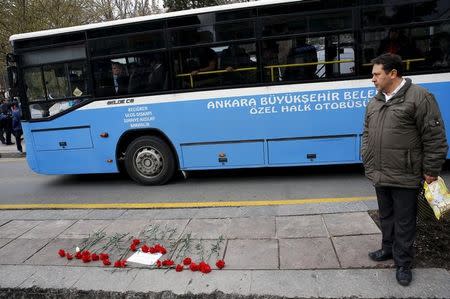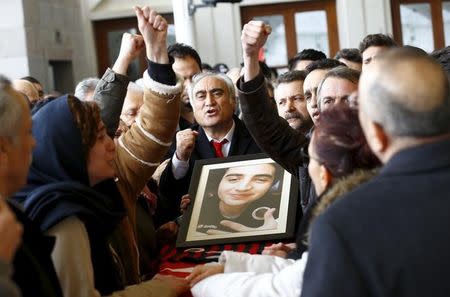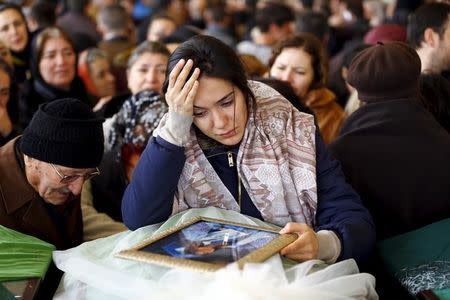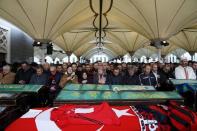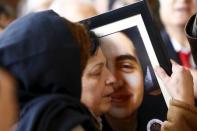Suicide bombing exposes divisions tearing at Turkey's stability
By Umit Bektas, Nick Tattersall and Humeyra Pamuk ANKARA/ISTANBUL (Reuters) - "Government resign!" chanted some of the mourners at the funeral on Tuesday of four young victims of the suicide bombing in Turkey's capital Ankara. "Our child has become a victim of ugly politics. We don't want any politicians at our funeral," one of the relatives called out, before family members hushed him and warned him against speaking out in front of journalists. Far from bringing the nation together in mourning, the aftermath of Sunday night's attack has again laid bare the deep divisions tearing at Turkey as it struggles to avoid being drawn into its neighbours' conflicts. If Turkey continues on this path, some analysts warn, it risks a cycle of violence and a lurch away from the European standards of freedom and democracy to which it once aspired. President Tayyip Erdogan shows little sign of healing the rifts. Parties from across the political spectrum - from nationalists to the pro-Kurdish opposition - have condemned the car bombing, which killed 37 people in the heart of Ankara and was the third in the city in five months. But the question of how to respond is far more divisive. Officials quickly blamed Kurdish militants. Turkish warplanes began bombing their camps in northern Iraq within hours, and clashes with the security forces widened in Turkey's predominantly Kurdish southeast. In his first speech since the attack, Erdogan said the country's anti-terrorism laws, already seen by rights groups as too invasive and used in recent months to detain academics and journalists, should be widened further. "It might be the terrorist who pulls the trigger and detonates the bomb, but it is these supporters and accomplices who allow that attack to achieve its goal," he told a dinner for doctors in his palace late on Monday. "The fact their title is lawmaker, academic, writer, journalist or head of a civil society group doesn’t change the fact that individual is a terrorist...We should redefine terror and terrorist as soon as possible and put it in our penal code." Erdogan's opponents say he is using anti-terrorism laws to silence dissent and that his authoritarian leadership is dangerously dividing a nation needed by its European and NATO allies as a bulwark against the instability of the Middle East. Almost as Erdogan spoke in Ankara, police used tear gas and water cannon to disperse several hundred leftist demonstrators in Istanbul who had gathered to protest what they perceive to be the government's failure to prevent Sunday's attack. Some in the crowd began chanting "Thief, Murderer, Erdogan", a rallying cry during the anti-government protests of recent years, prompting police to intervene, Reuters witnesses said. "ANGRY COUNTRY" "Turkey has become a country that can neither rejoice nor mourn together, or find a common sense to unite around. It has become an angry country, with ever shrinking and fragmenting tribal outlooks," said Turkish-British researcher Ziya Meral. "Pressure on media and denials of freedom of expression are only fuelling mistrust, dangerous propaganda and misinformation," Meral, a research fellow at Britain's Sandhurst military academy and founder of the London-based Centre on Religion and Global Affairs, wrote in a blog post. The ruling AK Party, founded by Erdogan more than a decade ago, was "no longer driven by pragmatism" but by its own survival and its ambition of securing the stronger presidential system that Erdogan wants, he said. Since winning Turkey's first popular presidential election in 2014, Erdogan has lobbied for replacing its parliamentary system with an executive presidency more akin to the United States or France. Many of his supporters, who represent just over half the electorate and see him as champion of the pious working class, believe the narrative that Turkey, battered by regional conflicts, needs strong leadership for its long-term stability. His opponents fear too much power in the hands of a man who brooks no dissent. CHAOS OR STABILITY Security officials have said the two perpetrators of Sunday's bombing, a man and a woman, were linked to the outlawed Kurdistan Workers Party (PKK), which has waged a three-decade insurgency for Kurdish autonomy in southeast Turkey. Prime Minister Ahmet Davutoglu said the authorities had "very serious and almost certain" evidence suggesting the PKK was responsible. There has been no claim of responsibility. Against a backdrop of rising violence in the southeast, where a PKK ceasefire collapsed in July, the AK Party campaigned for a parliamentary election in November by promising stability if it won, or the risk of chaos if it lost. It won, clawing back a majority lost five months earlier, but opponents say the victory brought anything but stability. "In the democratic countries of the world, when a bomb goes off, everyone would be side by side, shoulder to shoulder ... That is what we are missing," said Selahattin Demirtas, leader of the pro-Kurdish HDP, parliament's third largest party. "They don't give account. They don't apologise. They don't say we made a mistake ... They just keep polarising." Yet amid the fragmentation, there are no opposition figures who appear capable of bringing people together. The divisions are ever more keenly felt far beyond the corridors of power. Amedspor, one of the most prominent soccer teams in the southeast, were unable to find rooms for an away match in the central city of Sivas on Tuesday, with hoteliers refusing to take their reservation when they realised who was calling. Eventually the local governor's office found them accommodation 40 km (25 miles) out of town, the team's president, Ali Karakas, told Reuters. "We're seeing a severing of emotional bonds and this is such a dangerous thing," Karakas said. "Sports should be uniting. Brotherhood and solidarity should be its basis. But because of Turkey’s politics, even sport has been poisoned." (Additional reporting by Osman Orsal and Melih Aslan; Writing by Nick Tattersall; editing by Janet McBride)

